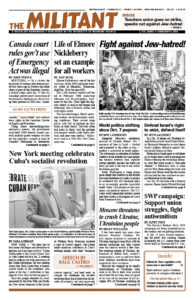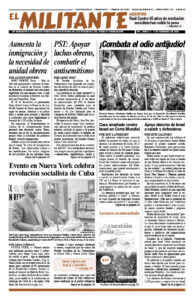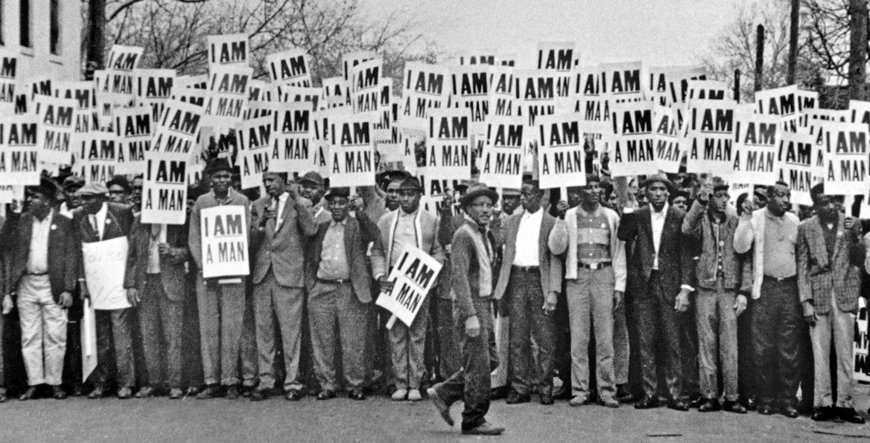Elmore Nickleberry, one of the last survivors of the 1968 sanitation workers strike in Memphis, Tennessee, died Dec. 30 at the age of 92.
The 1,300 workers walked off the job in February 1968, protesting inhuman and discriminatory treatment by the city. Their fight for dignity, safety, as well as fair wages and treatment, was a historic union and civil rights battle.
The overwhelmingly Black sanitation workers faced horrendous working conditions. They carried large plastic tubs full of garbage on their backs or their heads. The tubs often had holes in them “and the garbage and maggots would crawl down your back and onto your clothes,” Nickleberry said in a 2014 New York Times interview.
The workers who were white had showers at work but the Black workers weren’t allowed to use them. “I couldn’t ride the bus home because I stunk so bad,” said Nickleberry. He walked the 6 miles.
Strikers carried “I AM A MAN” signs. “The supervisors called us ‘boy,’” Nickleberry said. “You’d tell them, ‘I ain’t no “boy.” I am a man.’ And they’d keep calling you ‘boy.’”
On Feb. 1, 1968, two workers, Echol Cole and Robert Walker, climbed into the back of a garbage truck to escape a downpour. A malfunction caused the compactor to start running and they were crushed to death.
The union representing the workers, American Federation of State, County and Municipal Employees Local 1733, demanded a meeting with city officials. When they refused, 700 workers voted to strike.
The workers demanded union recognition and a contract with equal treatment on promotions and in the retirement system, overtime pay, increased wages and more. Wages were so low that 40% of the workers qualified for welfare and food stamps.
When city officials refused to meet the workers’ demands, telling them their strike was illegal, organizations in the Black community rallied behind the unionists. A thousand strikers met daily at the Rubber Workers hall. They and their supporters organized meetings and marches that mobilized thousands of workers. They were met with violence and brutality from city cops and state troopers. Thousands of National Guardsmen were called out.
The strikers held their first mass march Feb. 23. The cops attacked. “The police started whupping us,” Nickleberry told the Memphis Commercial Appeal in 2018. “I got hit hard.”
In March, Southern Christian Leadership Conference leader Martin Luther King Jr. came and spoke to 12,000 people at the Mason Temple and led a march of over 15,000. A small number of participants broke some store windows, which the police used as a pretext to attack marchers again.
Militant reporter Howard Reed gave a first-hand report of the brutality of the police. “The cops waded into the demonstrators with tear gas, chemical Mace and with clubs flying. They gunned down at least four people, and shot to death 16-year-old Larry Payne.” When demonstrators went to a church to wash tear gas out of their eyes and attend to their injuries, “the cops sprayed tear gas into the church,” Reed wrote.
King was assassinated in Memphis on April 4, a few days before he was to lead another march in support of the strike. His killing sparked mass protests throughout the country, including a march of over 40,000 in Memphis. The march in memory of King and in support of the sanitation workers included thousands of unionists. Fred Halstead and Paul Boutelle, the Socialist Workers Party candidates for president and vice president, joined the march.
In light of this massive outpouring of support, the determination of the workers to continue their strike and some pressure from President Lyndon Johnson, the city settled with the workers. “We got a good raise. We got showers. We got better working conditions. We got health benefits,” said Nickleberry. “The union came in and we got respect. They stopped calling us ‘boy’ and started calling us, ‘A Man. A Sanitation Man.’” They also got protection against racial discrimination on the job.
Nickleberry served in the Army in Korea. “They treated me better overseas than I was treated in Memphis,” he said.
Building unions in the South
“The victory of the 1968 strike was important for building the unions in the South,” Nickleberry’s great-nephew, Niqualus Nibley, a business agent for the International Brotherhood of Electrical Workers union Local 474 in Memphis, told the Militant. “We’ve come a long way but we still have a long way to go.” Nibley’s local has been active in supporting the eight-month-long strike by members of the Bakery, Confectionery, Tobacco Workers and Grain Millers union at International Flavors and Fragrances in Memphis.
“The labor movement today is definitely still aware of the fight the sanitation workers fought and we are stronger because of it,” Kermit Moore, president of the Memphis A. Philip Randolph Institute, told the Militant. Moore, whose uncle was a striker, has also helped build support for the BCTGM strike.
Some of the IFF strikers carry “I AM A MAN” signs. Striker Kenneth Cooper told the Militant, “They were bullied and they stood up and got justice.”
Because the workers hadn’t won government pensions, Nickleberry and a number of other workers kept working long after they turned 65. He finally retired in 2018 at 86. In 2017 the surviving strikers received lump sum payments of $50,000 to $70,000 from the city.
The Memphis Central Labor Council has been raising money to help supplement the income of the sanitation workers who are still alive by selling some of the original “I AM A MAN” posters signed by four of the surviving workers, Sweetrica Baker, Central Labor Council-Memphis secretary told the Militant.
Nickleberry was a fighter and a union man his whole life. “If we didn’t have a union, we would get nothing,” he said in 2014. “We’d be in the same shape as before. You got a union to back you, you achieve more.”



